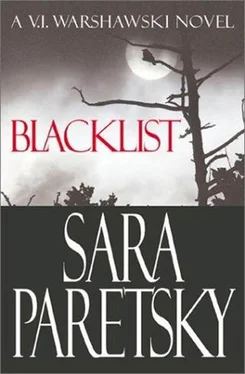Catherine bounced up from her ottoman. “I hope you make all those wusses take action. So many of them are like Marissa’s dad, yacking on and on about how it’s our duty to cooperate fully, we’re in a war situation, ordinary privacy doesn’t apply. Like it’s never dawned on him what they might find out about his own kid if the school gives them total access to our files. Marissa has-well, never mind. The Feds have been ruthless talking to Leila, since she’s from Pakistan. They figure since she’s Muslim she must have known Benji, but she’s such a snob she’s like totally offended they think she’d even talk to a dishwasher. And Marissa’s dad, well, how would he like to have the FBI in his files? I bet they’d find stuff like Enron if they only started looking.”
“Yes, darling, I know you’re ready to get on your horse and raise the siege of Orleans.” Renee smiled fondly at her granddaughter. “We can talk about it over dinner. Unless your friend is staying?”
“Oh. Oh. This isn’t a friend. It’s-” She floundered, unable to remember my name.
I stood. “I’m V I. Warshawski, Ms. Bayard. I’m a private investigator, although I originally trained as a lawyer.”
Catherine made a fast recovery. “I’m doing a story on her. On her work, I mean, for Vineleaves, you know, the school newspaper. A lot of kids meet private eyes who’ve been working on their parents’ divorces, but I figure not too many know anything about murder investigations.”
If Renee Bayard found her granddaughter’s restless manner odd, she didn’t comment on it: she was more concerned with me, saying in a voice heavy with censure, “Murder investigations? Why did you seek out my granddaughter?”
Catherine once more leapt into evasive action. “She didn’t, Gran. I mean, I called her. I had the idea, and I knew Mr. Graham worked with a lot of investigators, so I called and asked if he could suggest someone.”
“Mr. Graham needs a murder investigator?” Renee Bayard persisted, watching me sharply.
“Most of my work involves financial and industrial crime,” I said. “But some of my cases have included murders, and that’s always sexier to young people than someone shredding company papers to keep their financial fiddles secret.”
Renee Bayard gave a little nod, as if to acknowledge that I’d scored a point. “And are you working on something now for Mr. Graham?”
“Just think, Gran, she found a dead man in the pool out at Mr. Graham’s old home,” Catherine intervened.
“So it was you who found that unfortunate young man,” Renee Bayard said to me. “What made you look for him to begin with? Was that what Mr. Graham hired you to do?”
I smiled. “My clients appreciate having their private affairs kept private, ma’am. But I will tell you I found Marcus Whitby completely by accident. I was looking for-something else-and tumbled on him. Literally.”
“And you’re regaling my granddaughter with this tale?”
“We hadn’t got that far. Catherine was more interested in the techniques investigators use for getting information. She shows a remarkable capacity for imagining ways to circumvent the law.”
Renee Bayard frowned at me, perhaps because she found my words unacceptably frivolous, or maybe because she didn’t want me to encourage her granddaughter’s lawlessness: a girl enterprising enough to climb out through her bedroom window and drive off in the middle of the night probably had plenty of other escapades under her belt.
“Do you have any idea how the young man-Whitney, is it?-came to die out at Larchmont? Is there any thought of whether it was an accident or intentional?” Renee Bayard asked.
“Whitby. I don’t know what the DuPage sheriff is thinking, but Catherine has just been explaining to me that Rick Salvi is an old friend of your family. Salvi might say more to you than he would tell the press.”
Renee Bayard cocked her head at Catherine. “Trina, you shouldn’t call Sheriff Salvi a family friend. He’s a political acquaintance.”
She turned back to me. “I know you don’t want to reveal client secrets, but are you looking into young Whitney’s-no, Whitby’s-death? If he was murdered-my husband spends the whole year out in New Solway now.”
“We should call the Lantners,” Catherine said. “If there’s a murderer roaming around New Solway, they need to be on the lookout.”
I shook my head. “If Mr. Whitby was murdered, it was more likely by some homeowner out there who resented his presence on their land. I assumed when I found him it was an accident: I assumed he was meeting someone by appointment, and that he tripped on a loose brick by the pool and fell in-because that’s how I happened to find him.” I broke off to look at Catherine, fidgeting on her ottoman. “Wouldn’t it be helpful to take some notes, in case you actually decide to write up our interview?”
“Yes, darling,” Renee Bayard agreed. “You should never assume that you will have an accurate memory of what someone has said.”
Catherine glowered at me, but went to the work counter built into the far corner of the room and fished a spiral notebook from her backpack. Her grandmother frowned over what I’d said. “But if he was meeting someone out there, why haven’t they come forward?”
“He could have been having an affair with someone who lived out there and was taking advantage of the old Graham house standing empty, although he’d have to have a key to bypass the security system.”
Catherine jabbed her pencil through the holes in her notebook and started pulling apart the ends of the paper.
“Is that what you think?” her grandmother asked.
“I did at first, but he didn’t have any keys on him, not even his car keys. It’s possible they fell into the pond when he went in, but his car wasn’t anywhere on the grounds. I suppose the sheriff’s police will be finding out how he got there-he could have gone by train.” I wasn’t hopeful about that-Salvi seemed to want to wrap the story up in a package and be done with it. “After I met with Mr. Whitby’s associates at T-square this morning, I did wonder if he’d gone out there to consult your husband.”
Ms. Bayard’s hand went to her throat in a reflexive gesture of selfprotection. “Why would-what made you think that?”
“It was a leap. Mr. Whitby was doing a story on someone in the Federal Negro Theater of the thirties. You probably know they were pilloried in Congress for being Communists. I just thought-if some of Bayard Publishing’s writers had been blacklisted, Mr. Whitby might have wanted your husband’s inside view on how that affected them.”
“Mr. Bayard doesn’t grant interviews these days. If a journalist tried to call-well, our staff are very protective. They would have turned him away.” “Then maybe Mr. Whitby tried to pay a visit without an invitation,” I said, wondering whether it was Calvin or Renee’s decision that he didn’t grant interviews. “The T-Square staff don’t seem to know why Mr. Whitby went to New Solway-unless his editor, Simon Hendricks, does and won’t say. Hendricks says they have a policy against talking to anyone at Bayard Publishing.”
Renee Bayard smiled faintly. “Augustus Llewellyn muscled his way into becoming a journalism giant against a great deal of opposition-he was
launching T-square about the time my husband acquired Margent magazine. None of the big banks would fund a venture by a black publisher. My guess is that Augustus is simply unwilling to make the white journalism establishment a present of one of his reporters’ work.”
“Didn’t Grample help him out?” Catherine said, continuing to twist the edges of her notepaper. “I thought he put together the consortium-” “Yes, darling, but we’re not talking about your grandfather right now. Why don’t you finish your interview with Ms.-“
Читать дальше












